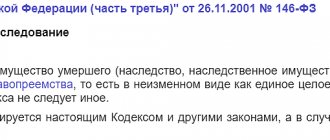4
Close people of the deceased may become owners of the inheritance by law or by will. In both the first and second cases, the circle of heirs is clearly defined. The legal heirs act in the order of priority established by the Civil Code of the Russian Federation, and the testator determines the successors under the will during his lifetime. One of the non-standard situations is the death of the applicant for real estate and savings. The key question is who will receive the benefits of the deceased if the successor died before entering into the inheritance?
Identification of a potential successor
The death of a person entails the opening of an inheritance. This means that heirs can receive or “purchase” the inheritance.
Claimants by law
In the absence of a will, the property is divided between:
- The first to inherit are the closest blood relatives and relatives (spouses, parents, children of the deceased, grandchildren by right of representation).
- Second in line are brothers and sisters (their children by right of representation), grandparents.
- Third in line are uncles, aunts and their children by right of representation.
Subsequent queues are more distant relatives who acquire valuables only in the absence of close contenders.
Separately, the 8th stage is highlighted - compulsory heirs. This:
- disabled citizens who were dependent on the deceased for at least 1 year before his death and who are relatives;
- not relatives who meet the specified conditions and lived with the testator for at least 1 year before the opening of the inheritance.
Their share of the inheritance is equal to the share of the applicants called up in order of priority.
Claimants under the will
A will is an official document that clearly defines the rights and obligations of legal successors.
The heir under a will can be an individual from among relatives, friends, acquaintances, organizations and even the state.
If there is a document, the obligatory heirs will receive at least ½ of the part allocated to them by law.
Non-standard situations
Some objects are inherited in a separate order. This applies to corporate rights and other types of property.
Accordingly, the legislation prescribes some exceptions to the rules. Let's look at this in more detail.
Inheritance of business, shares in LLC
It occurs by including the heir(s) among the participants of a particular company.
However, other founders may not agree to accept new members into their ranks. Alternatively, the successors in interest are paid the value of the deceased member's contribution.
To do this, you should study the constituent documents, accounting and other reporting. An independent examination may also be needed to establish the actual value of the deposit at the time of registration of the inheritance.
Mandatory share
If there is a will, then it is assumed that there is a mandatory share in the inheritance. Disabled relatives and dependents of the author of the will can claim it.
In a situation where one of the heirs dies before the opening of the inheritance case, the property due to him does not participate in determining the obligatory share.
Escheat
It refers to the property that has been transferred to the municipality.
Property acquires the status of escheat if there are no heirs at all or all of them have refused to formalize their rights. Then the apartment, house, and other assets are transferred to the balance sheet of the administration of the corresponding locality.
When the receiver has missed the time to enter into a real estate inheritance, it is recommended to pre-order an extract from the Rosreestr for the property. It is possible that it is already under the jurisdiction of a city or town.
What is the right of representation?
In paragraph 2 of Art. 1142, 1143,1144 of the Civil Code of the Russian Federation there is the concept of heirs by right of representation. This is the right of the descendants of a deceased heir, belonging to one of the first 3 orders according to the law, to receive property that would have been due to him during his lifetime.
The validity of the right begins only if the successor died before the opening of the inheritance or simultaneously with the person for whom he could receive the benefits.
The representation applies only to legal heirs. They “stand in” for a deceased relative, representing his interests and acquiring his share of the property.
If an ancestor was disinherited, descendants cannot claim the property by right of representation.
Example. Citizen S. had 2 sons and a sister of retirement age, who lived with the three of them for more than 1 year. One of the sons had a son, and the second had a wife and 2 daughters. All persons have reached the age of majority. The sons died in a car accident. A year later their father died. By right of representation, the property was transferred to: the grandson - 1/3 and granddaughters 1/6 each by right of representation, and the sister 1/3 as the heir of the obligatory share.
In this example, the sons did not have time to accept the inheritance due to death, and the children inherited their shares instead.
What to do if you failed to enter into inheritance on time?
There are 2 action algorithms for those who are late in contacting a notary:
- Agree with other heirs and obtain their consent to a new division of the deceased’s property.
- Contact the judicial authorities with a claim.
- obtain written consent from other applicants for the inheritance to include the latecomer in the share;
- issue a new notarial certificate;
- re-register property rights.
Consent must be written, notarized and given not under pressure, but on a voluntary basis. You can contact any notary body. But it is better to choose the notary office where the certificates were issued. If another office was chosen, the first notary who previously dealt with the issue needs to send consent signed by the heirs to include the late relative in the share.
When consents are sent by mail or entrusted to third parties for transmission, signatures on documents must be witnessed by a notary.
As soon as the notary’s office receives consent, its specialists cancel the previously issued certificate and draw up a new document.
The review procedure requires the submission of a documentation package, which must include:
- ID card of the new heir;
- death certificate of the testator;
- officially formalized assessment of real estate;
- if available, a will;
- a document stating that there is no debt to pay for housing and communal services;
- extract from the Unified State Register of Real Estate;
- explication from the BTI organ;
- papers identifying the owner or owners of real estate;
- documentation confirming the presence of family ties with the deceased;
- certificate of citizens registered in the living space.
The following circumstances may be accepted as a valid reason:
- serious illness, confirmed by certificates from medical organizations;
- illiteracy of the heir;
- a citizen being in a helpless state and similar reasons.
The court will not take into account such circumstances as:
- the citizen had no idea about the composition of the inherited mass;
- the applicant did not know the legislative norms and the deadlines within which he was obliged to apply to the notary authority;
- minor health problems, etc.
- Draw up a statement of claim based on paragraphs of Article 131 of the Code of Civil Procedure of the Russian Federation.
- Collect all necessary documentation to provide.
- Go to court with the collected papers and application.
- Wait for a court decision.
- Engage in registration of new rights to property, if such an opportunity has been received.
If the place of residence of the heir cannot be determined, you can contact the judicial authorities at the place of registration of the estate; the area of the last established residence of the defendant will also be suitable. When there is more than one defendant, you can choose an authority located where one of the heirs lives.
- plaintiff's identity card;
- a receipt showing that the required state duty has been paid;
- copies of the statement of claim according to the number of defendants for transmission to them;
- Documentary grounds proving the need to reconsider the case:
- certificates, extracts, etc., proving that the reason for failure to appear on time is valid;
- documents on the composition of the inheritance mass;
- papers confirming that the plaintiff has the right to inheritance;
- death certificate of the testator.
The court will accept everything that will help clarify the case and make it possible to resolve it in favor of the plaintiff.
- information about the plaintiff;
- information about the defendants;
- information about the deceased citizen who left an inheritance;
- the basis giving the plaintiff the right to appeal to the courts;
- the cost of the claim;
- the reason why the plaintiff could not come to the notary in a timely manner and its evidence;
- statement of request;
- list of attached documentation;
- date of compilation;
- plaintiff's signature.
You can find a sample form and application on the Internet and follow them when drawing up your own claim.
When going to court, a citizen must pay a fee in the following amount:
| The fee is charged for amounts exceeding (rubles) | Total value of the disputed property (rubles) | Allotted percentage | Fixed amount (rubles) |
| – | up to 20,000.00 | 4% | not less than 400.00 |
| 20 000.00 | 20 000.00-100 000.00 | 3% | 800.00 |
| 100 000.00 | 100 000.00-200 000.00 | 2% | 3 200.00 |
| 200 000.00 | 200 000.00-1 000 000.00 | 2% | 5 200.00 |
| 1 000 000.00 | from 1,000,000.00 | 0,5% | 13,200.00 (not more than 60,000.00) |
What is hereditary transmission?
The transfer of the right to accept an inheritance instead of a deceased potential successor, who could have inherited property by law or will within 6 months from the date of death of the testator, but did not have time to do this due to death, is called “hereditary transmission”.
The right operates on the basis of Art. 1156 of the Civil Code of the Russian Federation under the totality of circumstances:
- An inheritance case has been opened according to law or will.
- During the 6-month period, to either contact a notary and write a corresponding application, or actually accept the valuables. The latter means that until the moment of death, the applicant did not live in the property transferred to him, did not pay bills for the maintenance of the house or apartment of the deceased, did not maintain its safety and proper appearance.
- The intentions of a person who died within 6 months of the need to accept benefits cannot be established. The person did not take actions that would allow him to reliably know whether he wanted to acquire property, give it up, or actually use it.
If at least one of the conditions is not satisfied, the transfer of the property of the deceased occurs on other grounds.
Under the acceptance of inheritance in accordance with Art. 1153 of the Civil Code of the Russian Federation should be understood:
- filing an application at the place of residence of the owner of material wealth or the location of objects of the inheritance mass;
- performing actions for actual acceptance.
If the heir accepted the property of the deceased in the indicated ways, but died before receiving a certificate of inheritance, his descendants cannot receive the property through hereditary transmission.
Example diagram of transmission operation:
Expert opinion
Stanislav Evseev
Lawyer. Experience 12 years. Specialization: civil, family, inheritance law.
In the example considered, the “transmitter” or the person who did not have time to accept the property is the son, and the son’s wife is the “transmissor,” that is, a contender for the left-behind values of S. according to the rule of transmission.
The essence of the transmission is the restoration of justice for the loved ones of the deceased heir. If he had lived, he would have received the property. Transmission is a natural continuation of the process of acquiring benefits after the death of the heir and allows relatives to decide whether to refuse or receive valuables.
General principles of wills for property
Any capable citizen has the right to bequeath everything he has acquired after death to third parties. The equality of the parts may not be observed.
During his life, a person can write several versions of a will. In this case, only the last of them will have legal force.
Almost always the declaration of will is certified by a notary. The exception is cases when the document is written in conditions of direct threat to life.
These include:
- military operations;
- a sharp deterioration in health;
- dangerous injuries.
Here, the legislation allows for the usual written form of a will with the obligatory signature of at least two witnesses.
A declaration of will regarding property is always drawn up by only one person. If it is issued on behalf of two persons (for example, from mother and father), everything stated in the text is legally invalid.
Sub-designation of an heir in a will
So, we are coming close to the situation when the heir under the will meets his death before the testator.
In this case, a person can indicate in his will the person who will receive the relevant property due to the death of the main claimant to the property. In legal terminology, this mechanism is called sub-appointment of an heir.
Art. 1121 of the Civil Code of the Russian Federation allows such actions to be taken in a will even when a person dies after the testator, but without having time to contact a notary. The above applies to situations where a citizen refuses an inheritance or is declared unworthy of it.
When transmission fails
Some nuances may prevent you from becoming a transmitter:
Situation 1. If the successor died before the testator opened the inheritance, then the descendants of the latter are subject to the right of representation.
Example. Citizen S. has a son L. and daughter A. The son dies, and 1 year later the father dies. L.'s two daughters receive their grandfather's property by right of representation for their deceased father. If the cost of the apartment is 1 million rubles, the daughter will get ½ - 500 thousand rubles, and the granddaughters will get ¼ each, that is, 250 thousand rubles. each.
Assuming that the father dies before his son, and the son, due to death, does not have time to enter into an inheritance, L.’s wife, daughters and parents will be able to acquire part of S.’s valuables within the framework of his share.
Situation 2. If the successor missed the deadline for acceptance and did not have time to restore inheritance rights through the courts, transmission is not expected. According to Art. 1155 of the Civil Code of the Russian Federation, only a claimant by law or will can file an application with the court.
If the heir died after 6 months from the opening of the inheritance case, but did not express an intention to acquire it, the period for other applicants is extended by 3 months beyond the established one. The descendants of the deceased are not transmitters.
Example. Citizen F. died in July 2021. His son died in February 2021 (7 months later). The son’s wife will not be able to accept the values by right of transmission, since until April 2019, representatives of subsequent orders according to the law will be able to claim F.’s material benefits: brothers and sisters, uncles and aunts, etc.
Situation 3. If the applicant did not visit the notary, but began to actually manage the property of the deceased. Such actions are legally equivalent to writing an application for acceptance of inheritance.
In this case, the legal successor of the heir will receive the property by inheritance. They will not have to enter into transmission order. However, you may have to prove your rights in court.
Situation 4. If the applicant writes a waiver of the benefits due, then his heirs will not be able to change anything and will be deprived of the opportunity to purchase real estate and savings.
Step-by-step instructions: what to do and where to go?
There are two ways that will allow you to become the owner of an inheritance even if you missed the deadline.
The first method involves filing a claim if there were good reasons.
- First of all, it is necessary to draw up such a statement of claim. It should contain all the information about the author of the application, as well as describe the reasons why the omission occurred.
- Next, you need to attach documents that will confirm your words.
- The court will consider your application. If it turns out that your application was made legally, a trial date will be set.
- The court will familiarize itself with the reasons stated by the plaintiff, and in the course of the hearing will make a decision on whether they are valid or not.
- If they are, it means that the missed deadline will be restored. A new period, called restored, will begin to run.
The period from this day will begin to be calculated from the moment the court makes its decision. If the omission is not considered valid, then the claim will not be satisfied, which means that the heir will not be able to assume legal rights.
The second method is called extrajudicial, which means it is not associated with going to court. There is no requirement to go to court, which means you do not need to file a claim.
- However, you need to make a written statement in order to familiarize other heirs with such a statement.
- Together with a statement of request to restore the missed deadline, you must appear at the notary's office.
- At the same time, notify other heirs that they need to appear within the specified period.
- Next, you need to familiarize the heirs with the will, as well as the reasons why you missed the deadline.
- If the heirs decide that the reason is valid, then you can enter into inheritance rights. However, if it turns out that you missed the deadline for no good reason, the heirs may refuse. This means that all you have to do is go to court, or accept the reality.
Pre-trial settlement
Pre-trial settlement means that you do not go to court, but resolve the issue through mediation with the remaining heirs. Your task is to convince them that it is not up to you to miss the deadline granted by law for entering into an inheritance.
However, if the heirs decide that you are trying to deceive them, or your statement with the arguments set out in it does not seem plausible to other heirs, then you will need to resolve the issue through the courts.
We obtain written consent from all heirs
If you come to the notary and intend to notify all the heirs that you are claiming an inheritance even after the allotted time for carrying out this procedure, then you not only need to obtain the consent of the remaining heirs, but also collect written confirmation of this from them.
In order to obtain written consent, you need to properly acquaint the heirs with why you missed the deadline. Convince them that this happened through no fault of yours.
However, if they side with you, then ask them to document the fact that you are allowed to inherit. To do this, it is necessary to put written permission on an A4 sheet so that the period for entering into the inheritance begins to run again.
- written consent to include the heir who missed the deadline for accepting the inheritance in the list of persons accepting the inheritance
- written consent to include the heir who missed the deadline for accepting the inheritance in the list of persons accepting the inheritance
Certificate of ownership
The notary is present when drawing up written agreements. Once all the heirs have implemented their will in writing, the notary can draw up an agreement, according to which the period begins to be calculated anew.
Of course, such a paper must be properly certified and attached to the will. The notary must enter the preparation of such an act in his register. As soon as all actions are completed and the deed is signed by a notary, the period begins to be calculated anew, and the failed heir has the opportunity to claim the property again.
Inheritance upon death of legal successors: rules, terms
The consequences for successors of people who were unable to accept the inheritance will depend on the moment of death and the presence of a will.
To consider possible situations, let us assume that citizen A is the testator, B and B1 are his legal successors, C is the heir of citizen B.
Until the death of the testator
If citizen B dies before A's death or at the same time as him and therefore does not accept his property, the following happens:
- Applicants are called upon to inherit according to the law. If A wrote a will for citizen B, and the latter was unable to accept the property due to death, then the will does not apply to C.
- The legal successors of A by right of representation are the persons specified in paragraph 2 of Art. 1142, 1143,1144 of the Civil Code of the Russian Federation: grandchildren, nephews, cousins in order of priority upon death of children, brothers or sisters, nephews and nieces.
- The period for accepting values by right of presentation is 6 months from the date of death of citizen A.
After the death of the testator
If heir B dies within 6 months from the date of death of A, without having time to accept the property due to him, then:
- Citizen C can accept A's property as a transferee. The possibility of acquiring what was bequeathed is excluded if the testator has appointed an heir. However, if the basis for subassignment is refusal of succession, recognition as unworthy and other reasons, but not the death of the heir, the value will be accepted by the transmitter.
- Citizen C accepts benefits from A only if B dies.
- The acceptance period for C is at least 3 months from the date of B’s death.
- If citizen C refuses to accept material benefits and misses the established period, the property is transferred to the legal successor - B1.
How to divide correctly
There are different situations in life. It happens that the shares of each person are not initially determined. Then an agreement on the division of the inherited property is drawn up. When preparing its text, several factors are taken into account.
Thus, a person’s right to own and dispose of property may depend on the extent to which he took part in its maintenance, protection, and operation. In addition, when signing an agreement, professional interests are also taken into account.
For example, if a person is engaged in private transportation, then it is clear that he will need the car he inherited first of all.
Agreements between receivers may involve providing other candidates with certain monetary compensation in return. Its size and payment schedule are also fixed in the agreement between the heirs.
Algorithm of actions
The transmitter must contact one or different notaries. An inheritance case is opened for each property separately. In any case, the acceptance of the benefits acquired by the deceased is carried out in accordance with a certain algorithm of actions.
Step 1. Submitting an application
Separate applications are submitted for each type of inheritance:
- At the place of residence of the testator (A);
- At the place of residence of the transmitter (B).
If the place of residence is not reliably determined, it is necessary to contact the location of the real estate or the most valuable part of the movable property.
Sample application for inheritance through hereditary transmission
If one notary is involved in the affairs, different statements written according to the model are submitted to him. When acquiring property by right of representation, one application is submitted.
Step 2. Providing documents
List of required documents
| No. | Document function | Title of the document |
| 1 | Identity cards of legal successors | Passport, birth certificate for minors, identity cards and their translation for foreign citizens |
| 2 | Evidence of the death of the owners | Death certificates of testators |
| 3 | Data on the presence of family ties | Birth certificate, marriage certificate |
| 4 | To reliably determine the place of opening of the inheritance | certificate of residence |
| 5 | To determine the circle of legal successors | Certificate of family composition |
| 6 | Title documents for the deceased's valuables | Property purchase and sale agreement, certificate of ownership, registration certificate |
| 7 | Documents on the assessment of inherited property to determine the amount of state duty | Certificate from Rosreestr, BTI or assessment report from a commercial organization |
At this stage, you must pay the state fee and provide the notary with a receipt for payment.
Step 3. Obtaining a certificate of inheritance
Deadlines for issuing the document:
- 3 months remain before the acceptance of the inheritance by right of transmission from the date of death of the testator, the period will be extended to 3 months , after which a certificate is issued. It will be impossible to restore the deadline.
- If the inheritance occurs by right of representation, the document will be issued 6 months from the date of opening of the inheritance.
Certificates can be issued earlier if the circle of legal successors is reliably determined and all documents are collected by the notary. Subsequently, they are presented to Rosreestr and the State Traffic Safety Inspectorate for registration of ownership.
Typical questions on the topic
For many fellow citizens, entering into an inheritance causes some difficulties. Therefore, below we have collected answers to the most pressing questions related to the topic of this article.
My mother died, who was included in the will of my still living grandmother. Can I inherit now?
In your case, you will be one of the heirs to your mother’s share prescribed in the will. However, all necessary actions should begin after the death of the grandmother.
As for the mother’s personal property, you can begin to arrange it now.
How to check whether a relative has drawn up a will
Many people today do not include their surroundings in their property plans. Therefore, the existence of a will may come as a surprise.
To ensure the availability of a document after the death of a relative, it is enough to make a request to the notary chamber of the region where the deceased person was registered. There is also a Register of Inheritance Cases, which contains the necessary information.
It contains information about all actions performed by notaries (including certification of wills).
Cost of inheritance
The costs of acquiring the property of a relative who died but did not have time to accept the inheritance will be:
- 0.3% of the value of the inheritance for spouses, parents, children, siblings, but not more than 100,000 rubles;
- 0.6% for other heirs, but not more than 1,000,000 rubles.
Example. Citizen B. bequeathed an apartment worth 1,000,000 rubles. son S. B died on 01/04/2018, and S - on 01/20/2018, without having time to accept the inheritance. The value of the son’s property in the form of an apartment is 4,000,000 rubles. His wife will accept her father-in-law’s valuables as a transmitter, paying a state fee of 6,000 rubles. (RUB 1,000,000 X 0.06%). When accepting a spouse's apartment as an inheritance, the wife is exempt from paying state duty, since she lived in it with her husband and in accordance with Art. 333.38 of the Tax Code of the Russian Federation falls into the category of persons entitled to benefits.
In the above example, the spouse is the transmitter, since less than 6 months passed between the death of the father-in-law and the husband. If the husband had died on or before the death of his father on July 5, 2018, the wife would have inherited only the husband's property.
In addition to the state fee, the heirs pay the notary for technical and legal services, the cost of which is established by regional notary chambers. You can find out more about the tariff on the website of the Federal Notary Chamber.
Distribution of property when close heirs miss deadlines
The inheritance is transferred to the state as a last resort. As a rule, there are people who have the right to claim the property of the deceased. But there are general principles that state that in the case where a will has not been drawn up, redistribution is carried out according to the procedure established by the state. There is a clearly defined queue.
Who is the first heir?
The primary successors are spouses, parents and children. Moreover, a minor child is assigned a mandatory share, which cannot be challenged even in court. The same applies to other persons if they were dependents during the year before the death of the testator.
But we are talking only about part of the inheritance; the rest of the property is distributed equally. You can formalize a waiver of inheritance in favor of another, and this is the best way to distribute property without scandal. If there are no first-priority applicants, the deceased’s inheritance is distributed among the participants of the second priority, etc. Persons living together without formal marriage do not have rights to property.
Fractional parts
If the property was purchased by spouses during marriage, the surviving spouse has the right to allocate the marital share. That is, usually 1/2 of the share (if there is no marriage contract) goes to the surviving spouse according to a document issued by a notary. This document is called a “Certificate of Title.” And only after this is the inheritance formed after the deceased spouse - this is the second 1/2 share. It is she who will be inherited by the heirs. In the absence of a will - in equal shares between citizens called to inherit a certain order, in the case of a will - there are options for dividing and allocating obligatory shares under Art. 1148-1149 of the Civil Code. In addition, the will can be contested; this should be taken into account when registering an inheritance.
Rubric “Question/Answer”
My mother was entitled to a mandatory share of the inheritance. But she died almost immediately after the testator, without having time to enter into the inheritance. Can I, as a son, use the transmission and receive a mandatory share after the death of my mother?
Expert opinion
Semyon Frolov
Lawyer. 7 years of experience. Specialization: family, inheritance, housing law.
No, the obligatory share in the inheritance is closely related to the personality of the heir. If he was disabled, needy and dependent on the testator, then he is entitled to part of the property of the deceased. This is a kind of financial assistance. Even if the heir’s name suddenly does not appear in the will, he will be allocated a share of the intestate property. cannot claim it , since they do not fall under the provisions of paragraph 1 of Art. 1149 of the Civil Code of the Russian Federation. Consequently, you will not be able to accept your mother’s obligatory share, which was due only to her!
Our mother died, my brother and I abandoned our inheritance in favor of our father (and soon our father died). What are the next steps for my brother and I to take into inheritance? There is no father's will.
Expert opinion
Dmitry Nosikov
Lawyer. Specialization: family and housing law.
By refusing the inheritance in favor of your father, you and your brother lost the right to inheritance. It is no longer possible to withdraw the refusal ; this is prohibited by law (clause 3 of Article 1157 of the Civil Code of the Russian Federation). The fact of the death of the heir in whose favor the inheritance was refused does not matter. We are talking only about your desire not to enter into an inheritance. Even if you contact a notary, he will not cancel the waiver. After the death of the father, his children enter into the inheritance, and if there are none, the right of inheritance passes to the second priority : brothers, sisters, grandparents. And only on the mother’s side.
Mom and stepfather had an apartment in equal shares. My mother bequeathed her share to me (her daughter), my stepfather claimed the right to the obligatory share, but died four months after my mother. Question: will I receive my mother’s share of the apartment in full or will my stepfather’s niece receive five-eighths, and I will receive three-eighths?
Expert opinion
Semyon Frolov
Lawyer. 7 years of experience. Specialization: family, inheritance, housing law.
First, let’s figure out who inherits an apartment and on what grounds:
- You (daughter) inherit from your mother, who made a will, where she indicated you as an heir. The share noted in the will must go to you in full.
- The stepfather's niece inherits from him by law or by will. She is not entitled to a mandatory share, because Only the stepfather had this right. His successors cannot inherit the OA, which means they will not be able to increase their shares in the inheritance.
Conclusion: everything that your mother bequeathed in your favor will pass to you in full. The niece will only inherit her share, which her stepfather left her.
Two spouses die, three days apart. Both left behind heirs, some out of wedlock. Who will inherit whom and how? Which of the deceased spouses could claim the share of the second?
Expert opinion
Dmitry Nosikov
Lawyer. Specialization: family and housing law.
The first thing to do is order death certificates. The registry office issues them within one day. Next, you need to look at the dates of death of both spouses. The surviving spouse has the right to inherit the deceased spouse, i.e. you need to compare both dates. However, the surviving spouse also died soon after. This means that hereditary transmission operates within the framework of Art. 1156 of the Civil Code of the Russian Federation. In the absence of a will, the children of the second spouse (including illegitimate ones) enter into the inheritance of the first spouse. Along with them, the heirs of the first line are called upon - mother, father and children. Further, the property of the second spouse is inherited in the same way. In this case, hereditary transmission no longer applies - the date of death of the first spouse is earlier than the second. The greatest chances for a share in the inheritance are for the illegitimate children of the second spouse. They will inherit the father/mother's share as part of the transmission, and then take over the parent's inheritance within the framework of the law. They will also have the right to refuse both grounds, one of them, or use both at once (if desired).
A peaceful resolution of issues benefits the heirs.
However, if disputes arise, they must be resolved promptly. Very often, some applicants mislead others. And hereditary transmission is a favorable basis for such actions. The situation can be confusing, and often leads to missing deadlines, going to court, falsifying documents, and concealing a will. Heirs who act within the framework of the transmission are required to know their rights. Otherwise, they may lose their property. We recommend that you do not proceed at your own risk. Enlist the help of an experienced lawyer. This will save you from rash steps and unnecessary costs. Will the lawyer explain your rights, point out mistakes, evaluate the legality of inheritance and tell you when to give up your property? Contact us, consultations are free and affordable! Attention!
- Due to frequent changes in legislation, information sometimes becomes outdated faster than we can update it on the website.
- All cases are very individual and depend on many factors. Basic information does not guarantee a solution to your specific problems.
That's why FREE expert consultants work for you around the clock!
- via the form (below), or via online chat
- Call the hotline:
- Moscow and the Region
- St. Petersburg and region
- FREE for a lawyer!
By submitting data you agree to the Consent to PD Processing, PD Processing Policy and User Agreement.
Anonymously
Information about you will not be disclosed
Fast
Fill out the form and a lawyer will contact you within 5 minutes
Tell your friends
Rate ( 2 ratings, average: 5.00 out of 5)
Author of the article
Irina Garmash
Family law consultant.
Author's rating
Articles written
612
Death of an heir before or after the opening of the estate
To implement the last will of the testator, it is necessary to appoint not only a successor, but an entity that takes over the powers of the latter in the event of his untimely death. This is necessary to prevent the death of a person after gaining rights, without completing the necessary procedures. Having another trustee will solve potential problems, allowing you to receive property that is legally due.
Important! After the death of the citizen who began the execution of the will, the possibility of possessing valuables passes to the heirs of the first subject, to the legal successors of the deceased person. Finding out their ownership is the job of the notary who conducts the inheritance case.
The legal successors of the deceased subject apply hereditary principles under a will or law. A citizen disposes of property at his own discretion, without regard to the time the property, assets, and valuables of various kinds are in the possession of another person.
When the testator dies before the testator, the property that he did not manage to make his own is transferred to other entities through transmission. Only subject to the conditions of the absence of an application for receipt of property, and the facts of the use of these values.






